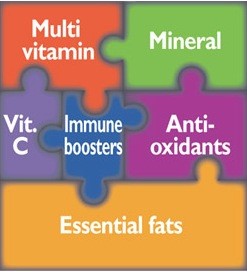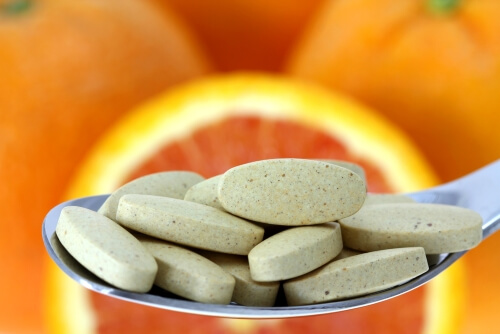Additionally the recommended daily allowances (RDAs) simply aren’t high enough to ensure optimum health – they are set at levels that just prevent us getting a deficiency disease such as scurvy in the case of vitamin CWhat it does: Strengthens immune system – fights infections. Makes collagen, keeping bones, skin and joints firm and strong. Antioxidant, detoxifying pollutants and protecting against….
Instead, through a combination of a well balanced diet and a good supplementation programme, you should try to achieve an optimum daily allowance (ODA) of vitamins and minerals – which will help you to achieve great health. As a result you’ll notice a lot of benefits to your health including a boost in your immunity (less colds and infections), increased energy and a reduced risk of getting chronic disease like cancer and heart disease.
This article will explain exactly what you should include in your supplementation programme and why.
The basic building blocks of a good supplement programme
It’s impossible to fit all the nutrients you need in one tablet so nutritional therapists use ‘formulas’ – combinations of vitamins and minerals – that, when combined appropriately, more or less reach your needs. In a typical health supplement programme you may end up with four supplements to take. These formulas are like building blocks. The essential building blocks are shown in the Supplement Jigsaw below.

These ‘jigsaw pieces’ pieces make it much simpler to understand what you need in your supplement programme and below you’ll find what to look for in each one:
1. Multi-vitamin and mineral
The starting point of any supplement programme is a high potency multivitamin and multi-mineral. This should provide the following nutrients:
Multi-vitamin – a good multivitamin should contain:
- Vitamin A (7,500iu) – needed for healthy skin and protecting against infections.
- Vitamin DWhat it does: Helps maintain strong and healthy bones by retaining calcium. Deficiency Signs: Joint pain or stiffness, backache, tooth decay, muscle cramps, hair loss…. 10mcg (400iu) – helps maintain strong and healthy bones
- Vitamin EWhat it does: Acts as an antioxidant, protecting cells from damage, including against cancer. Helps body use oxygen, preventing blood clots, thrombosis, atherosclerosis. Improves wound… (100iu) – a powerful antioxidantAntioxidants are substances that protect cells within the body from damage caused by free radicals. They help to strengthen the body’s ability to fight infection… which protects body cells from damage and helps the body use oxygen, preventing blood clots, improving wound healing and fertility.
- Vitamin C (250mg)- strengthens the immune system and keeps bones, skin and joints firm and strong.
- B vitamins – 25mg each of B1, B2, B3, B5 and B6, 10mcg of B12, 200mcg of folic acidWhat it does: Critical during pregnancy for the development of a baby’s brain and nerves. Also essential for brain and nerve function. Needed for utilising… and 50mcg of biotinWhat it does: Particularly important in childhood. Helps your body use essential fats, assisting in promoting healthy skin, hair and nerves. Deficiency Signs: Dry skin,… – these all work together and are essential for energy, brain function, healthy skin and hair, hormones and digestion.
Multi-mineral – this should provide:
- CalciumWhat it does: Promotes a healthy heart, clots blood, promotes healthy nerves, contracts muscles, improves skin, bone and dental health, relieves aching muscles and bones,… (300mg) – promotes a healthy heart, improves skin, bone and teeth health, relieves aching muscles and bones
- MagnesiumWhat it does: Strengthens bones and teeth, promotes healthy muscles by helping them to relax, also important for PMS, important for heart muscles and nervous… (150mg) – strengthens bones and teeth, promotes healthy muscles and essential for energy.
- IronWhat it does: As a component of red blood cells, iron transports oxygen and carbon dioxide to and from cells. Also vital for energy production…. (10mg) – vital for energy
- ZincWhat it does: Component of over 200 enzymes in the body, essential for growth, important for healing, controls hormones, aids ability to cope with stress… (10mg)- has many purposes – it’s essential for growth, important for healing and energy and helps the body cope with stress.
- ManganeseWhat it does: Helps to form healthy bones, cartilage, tissues and nerves, stabilises blood sugar, promotes healthy cells, essential for reproduction and red blood cell… (2.5mg) – helps to form healthy bones, cartilage, tissues and nerves, stabilises blood sugar and is essential for reproduction.
- ChromiumWhat it does: Helps balance blood sugar, normalise hunger and reduce cravings, improves lifespan, helps protect cells, essential for heart function. Deficiency Signs: Excessive or… (20mcg) – balances blood sugar and helps to normalise hunger and reduce cravings.
- SeleniumWhat it does: Antioxidant properties help to protect against free radicals and carcinogens, reduces inflammation, stimulates immune system to fight infections, promotes a healthy heart,… (25mcg)- reduces inflammation, helps fight infections and promotes a healthy heart.
- Plus ideally some molybdenumWhat it does: Helps rid the body of protein breakdown products, strengthens teeth and may help reduce the risk of tooth decay, detoxifies the body…, vanadium and boron should all be included.
2. Add extra vitamin C and other immune boosting nutrients
Vitamin C – this is worth taking separately because the amount you need won’t fit in a multi. The supplement should provide around 1,800mg of Vitamin C. Some vitamin C formulas also provide other key immune boosting nutrients such as bioflavonoidsBioflavonoids are sometimes referred to as vitamin P. Flavonoids are widely distributed in plants and are known for their antioxidant activity…. or anthocyanidins in the form of black elderberry and bilberry and zinc.

3. Add extra antioxidant nutrients
An optimal intake of antioxidant nutrients slows down the ageing process and prevents a variety of diseases so it is well worth supplementing extra antioxidant nutrients – on top of those in a good multivitamin – to ensure you achieve the best possible ageing protection. The kind of nutrients you should look for in an antioxidant supplement are vitamins A, C, E and beta-carotene, zinc and selenium, possibly iron, copper and manganese, the amino acidsAmino acids are commonly known as the building blocks of protein. There are 20 standard amino acids from which almost all proteins are made. Nine… glutathione or cysteine, plus phytonutrients such as bilberry extract, elderberry extract, pycnogenol and grape seed extract. These plant chemicals, rich in bioflavonoids and anthocyanidins, are also often supplied in more comprehensive vitamin C formulas.
4. Include enough essential fats
Your essential fats are omega 3 and omega 6 – they promote a healthy heart, thin the blood, reduce inflammation and improve the function of the nervous system. You can get enough of these from your diet if you eat either a heaped tablespoon of ground seeds every day, have a tablespoon of special cold-pressed seed oils and/or eat oily fish three times a week. If you’re unlikely to manage this then you can supplement them.
- Omega 3 (350mg EPAEPA is short for Eicosapentaenoic Acid. It is an essential omega-3 fatty acid found in fish such as salmon, mackerel and herring, and is often…, 350mg DHADHA is short for Docosahexaenoic Acid. It is an essential omega-3 fatty acid found in fish such as salmon, mackerel and herring, and is often…) – take either flax seed oil capsules or the more concentrated fish oil capsules providing EPA and DHA.
- Omega 6 (110- 260mg) – supplement a source of GLAGamma Linolenic Acid (GLA) is an essential fatty acid within the omega-6 family. It is found primarily in plant based oils such as evening primrose… such as evening primrose oil or borage oil. Even better is a combination of all three – EPA, DHA and GLA.
These are the basic building blocks of a good supplement programme. I take these every day and when combined with a well balanced diet should help you to be the healthiest you can be.
You can get a supplement programme designed specifically for you from the 100% Health Programme – simply complete the questionnaire online and you’ll receive your ideal diet, lifestyle and supplement programme. Click here to start.
Click here to see what nutrient intake you achieve by diet alone – and how this compares to the optimum daily intake (ODA).
To find out more about optimum nutrition read The Optimum Nutrition Bible or Optimum Nutrition Made Easy.

Comments
Join the Conversation on our Facebook Page